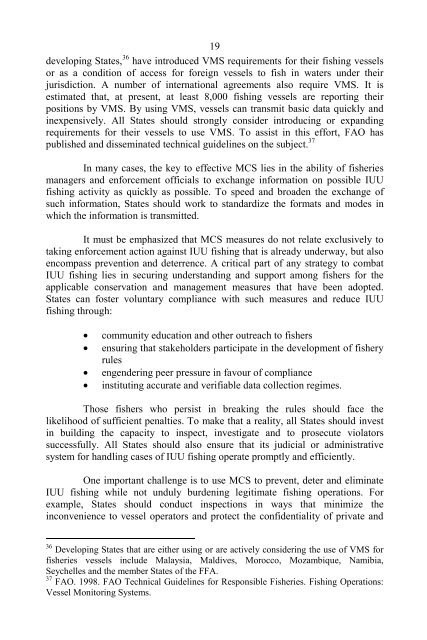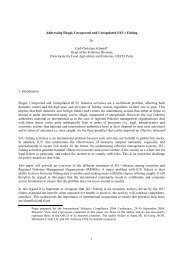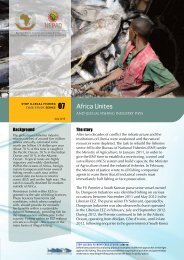Implementation of IPOA/IUU - International MCS Network
Implementation of IPOA/IUU - International MCS Network
Implementation of IPOA/IUU - International MCS Network
You also want an ePaper? Increase the reach of your titles
YUMPU automatically turns print PDFs into web optimized ePapers that Google loves.
19developing States, 36 have introduced VMS requirements for their fishing vesselsor as a condition <strong>of</strong> access for foreign vessels to fish in waters under theirjurisdiction. A number <strong>of</strong> international agreements also require VMS. It isestimated that, at present, at least 8,000 fishing vessels are reporting theirpositions by VMS. By using VMS, vessels can transmit basic data quickly andinexpensively. All States should strongly consider introducing or expandingrequirements for their vessels to use VMS. To assist in this effort, FAO haspublished and disseminated technical guidelines on the subject. 37In many cases, the key to effective <strong>MCS</strong> lies in the ability <strong>of</strong> fisheriesmanagers and enforcement <strong>of</strong>ficials to exchange information on possible <strong>IUU</strong>fishing activity as quickly as possible. To speed and broaden the exchange <strong>of</strong>such information, States should work to standardize the formats and modes inwhich the information is transmitted.It must be emphasized that <strong>MCS</strong> measures do not relate exclusively totaking enforcement action against <strong>IUU</strong> fishing that is already underway, but alsoencompass prevention and deterrence. A critical part <strong>of</strong> any strategy to combat<strong>IUU</strong> fishing lies in securing understanding and support among fishers for theapplicable conservation and management measures that have been adopted.States can foster voluntary compliance with such measures and reduce <strong>IUU</strong>fishing through:community education and other outreach to fishersensuring that stakeholders participate in the development <strong>of</strong> fisheryrulesengendering peer pressure in favour <strong>of</strong> complianceinstituting accurate and verifiable data collection regimes.Those fishers who persist in breaking the rules should face thelikelihood <strong>of</strong> sufficient penalties. To make that a reality, all States should investin building the capacity to inspect, investigate and to prosecute violatorssuccessfully. All States should also ensure that its judicial or administrativesystem for handling cases <strong>of</strong> <strong>IUU</strong> fishing operate promptly and efficiently.One important challenge is to use <strong>MCS</strong> to prevent, deter and eliminate<strong>IUU</strong> fishing while not unduly burdening legitimate fishing operations. Forexample, States should conduct inspections in ways that minimize theinconvenience to vessel operators and protect the confidentiality <strong>of</strong> private and36 Developing States that are either using or are actively considering the use <strong>of</strong> VMS forfisheries vessels include Malaysia, Maldives, Morocco, Mozambique, Namibia,Seychelles and the member States <strong>of</strong> the FFA.37 FAO. 1998. FAO Technical Guidelines for Responsible Fisheries. Fishing Operations:Vessel Monitoring Systems.
















